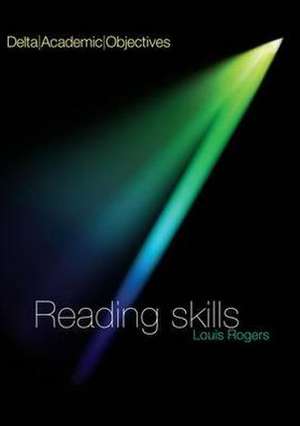DELTA ACAD OBJ - READING SKILLS CB
Autor Louis Rogersen Limba Engleză Paperback – aug 2011
Preț: 140.62 lei
Preț vechi: 183.26 lei
-23% Nou
Puncte Express: 211
Preț estimativ în valută:
26.91€ • 28.16$ • 22.40£
26.91€ • 28.16$ • 22.40£
Carte indisponibilă temporar
Doresc să fiu notificat când acest titlu va fi disponibil:
Se trimite...
Preluare comenzi: 021 569.72.76
Specificații
ISBN-13: 9781905085569
ISBN-10: 1905085567
Pagini: 250
Ilustrații: Illustrations
Dimensiuni: 213 x 294 x 9 mm
Greutate: 0.4 kg
Editura: Cengage ELT
ISBN-10: 1905085567
Pagini: 250
Ilustrații: Illustrations
Dimensiuni: 213 x 294 x 9 mm
Greutate: 0.4 kg
Editura: Cengage ELT
Recenzii
Introduction Understanding the text Using the text Critical thinking Language Focus Unit 1 Education Identifying purpose and audience Selecting texts Identifying stance 1 Selecting vocabulary 2 Features of formal writing Unit 2 Leadership Skimming vs. scanning Selecting information and context Questions to analyze texts 1 The Academic Word List 2 Dictionary skills - meaning Unit 3 Language learning Unknown vocabulary Summarizing Fact and opinon 1 Tense review - past and present simple 2 Common suffixes Unit 4 Sustainability Predicting content Paraphrasing Reasons and conclusions 1 Prefixes 2 Dictionary skills - word form Unit 5 Crime Identifying relationships between ideas and theories Discussing texts Cause and connection 1 Modals and hedging 2 Alternative and counter-arguments Unit 6 Revision Unit 7 Culture Text organization Integrating ideas Bias, expertise and neutrality 1 Connected ideas 2 Pronoun referants Unit 8 Personality Speed vs. accuracy Direct quotes Significant ideas 1 Noun collocations 2 Noun phrases Unit 9 Ethics Main ideas and supporting evidence Indirect quotes Persuasive language 1 Active vs. passive 2 Verb collocation Unit 10 Consumer behaviour Claims and assumptions Summarizing from multiple sources Evaluating evidence 1 Comparison and contrast multiple sources 2 Reporting Unit 11 Nutrition Drawing conclusions Bibliographies and references Statistics 1 Cause and effect references 2 Describing graphs Unit 12 Revision Academic Word List Exercises (Units 1-12)
Cuprins
Introduction Understanding the text Using the text Critical thinking Language Focus Unit 1 Education Identifying purpose and audience Selecting texts Identifying stance 1 Selecting vocabulary 2 Features of formal writing Unit 2 Leadership Skimming vs. scanning Selecting information and context Questions to analyze texts 1 The Academic Word List 2 Dictionary skills - meaning Unit 3 Language learning Unknown vocabulary Summarizing Fact and opinon 1 Tense review - past and present simple 2 Common suffixes Unit 4 Sustainability Predicting content Paraphrasing Reasons and conclusions 1 Prefixes 2 Dictionary skills - word form Unit 5 Crime Identifying relationships between ideas and theories Discussing texts Cause and connection 1 Modals and hedging 2 Alternative and counter-arguments Unit 6 Revision Unit 7 Culture Text organization Integrating ideas Bias, expertise and neutrality 1 Connected ideas 2 Pronoun referants Unit 8 Personality Speed vs. accuracy Direct quotes Significant ideas 1 Noun collocations 2 Noun phrases Unit 9 Ethics Main ideas and supporting evidence Indirect quotes Persuasive language 1 Active vs. passive 2 Verb collocation Unit 10 Consumer behaviour Claims and assumptions Summarizing from multiple sources Evaluating evidence 1 Comparison and contrast multiple sources 2 Reporting Unit 11 Nutrition Drawing conclusions Bibliographies and references Statistics 1 Cause and effect references 2 Describing graphs Unit 12 Revision Academic Word List Exercises (Units 1-12)
